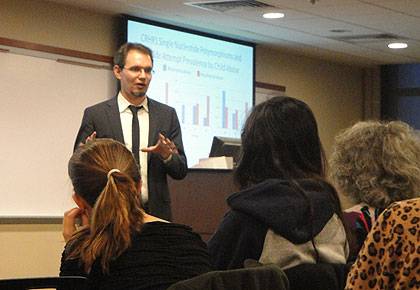
Any child thrust into
the middle of a war is bound to face trauma, but after years of working with
child soldiers in Nepal, Dr. Brandon Kohrt says not all trauma is equal: The
culture of the child's community has a significant influence on long-term
effects.
A resident in the
Department of Psychiatry at Emory University, Kohrt has regularly traveled to
Nepal since 1996. He spoke at a Duke Global Health Institute faculty research seminar Tuesday in
Perkins Library.
Kohrt's most recent
research focused on the effects and implications of traumatic events on child
soldiers who served in a Maoist army and returned home at the end of Nepal's
People's War in 2006. He has produced a
documentary film on the topic, "Returned:
Child Soldiers of Nepal’s Maoist Army."
Kohrt said his team
looks at how traumatic events were mapped onto overall experience.
"In Nepal there
is the idea of karma," Kohrt said. "If an individual experiences a
traumatic event it is their fault. This has implications for one’s social
standing in Nepal. Those who are likely to be vulnerable to these traumatic
events on those in lower castes, women, those who already had problems such as
alcoholism, the elderly and children."
One study compared a
test group of child soldiers with a group of civilian children from the same
communities and with the same educational experiences. Child soldiers have more
problems with depression, anxiety and post-traumatic stress disorder PTSD.
However, the results
were not the same across the board. The child soldiers from almost entirely Hindu
communities had more problems with mental illness. The study found that after
these solder returned home they had a harder problem becoming reintegrated with
their families and peers. Children returning to a mixed community were greeted
with more receptive parents and friends. They may have fought in the same
battle but the conditions they came home to were very different.
Kohrt said he seeks
to make post-traumatic stress disorder more readily identifiable and treatable
in these regions of Nepal through the investigation of cultural, behavioral and
biological bases of differential human well-being.